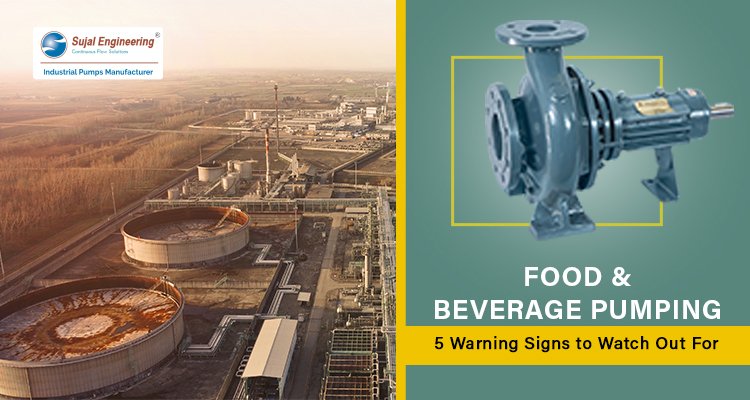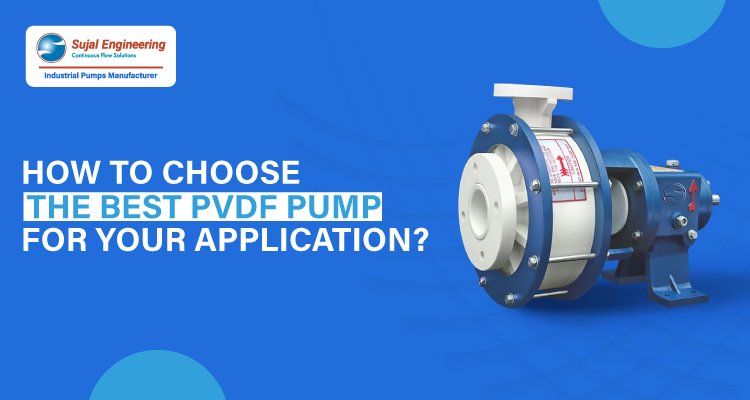Food and Beverage Pumping: 5 Warning Signs to Watch Out For

Food-grade pumps can effectively handle diverse materials with utmost hygiene in the food and beverage industry.
But have you ever seen a pump explode? If yes, you probably know how destructive and expensive it can be.
Even after installing reliable pumps in your industry, it’s crucial to remember that these pumps handle large amounts of materials, from regular to corrosive liquids, which can lead to wear and tear over time.
Are you aware of warning signs of any pump problems? And, more importantly, how to detect them? If not, now you will!
Whether you have just installed a food grade pump or are willing to ensure the pump’s longevity and reliability, it never hurts to gain some useful tips.
Here is a list of the top 5 warnings to consider as a wake up call and avoid to ensure the pump’s performance.
Different Types Of Pumps Used In Food Industry
Before we jump into the top 5 warning signs, let’s take a look at the list of different types of industrial pumps used in the Food industry.
5 Warnings Signs To Look For
Pump Cavitation
Pump cavitation is a common problem that occurs when the liquid being pumped vaporizes due to low pressure or a restricted flow, leading to the formation of bubbles that can damage the pump’s impeller and casing.
This cavitation can cause due to following reasons
- Restrictions in your pump suction line
- Too high suction lift
- Excess pump flow from downhill pumping
Symptoms of pump cavitation
- Decrease in flow rate
- Increased noise
- Unexpected vibration
- Seal or bearing failure
- Impeller erosion
How to address this issue?
If your pump faces any of the above symptoms, try and identify if any cavitation is present or not. It is essential to avoid pump cavitation in order to maintain efficiency and increase pump life.
To address the problem of pump cavitation, you should inspect the pump’s inlet and outlet pipes, adjust the pump’s speed or impeller size, or increase the liquid’s pressure.
Corrosion
Metallic corrosion can occur in food processing pumps due to the chemical reaction between the pump material and the liquid being pumped with the pump’s surface.
When corrosion occurs in pumps, it can lead to reduced pump life, low pump performance, and efficiency, causing leakage and contamination. And in some extreme cases, it can lead to pump failure too.
Symptoms of corrosion
- Rusting
- Pitting
- Discoloration
How to address this issue?
Firstly to avoid corrosion, make sure that you are selecting the right pump manufactured from corrosion compatible materials and resistant enough to handle highly corrosive liquids.
Secondly, apply a protective coating or use anti-corrosive agents to avoid corrosion.
Temperature
Another crucial warning sign to watch out for is the pump temperature and pressure. High pump casing temperature causes recirculation, which can damage the mechanical seal.
This extreme temperature or pressure can cause issues in the pump, which can result in pump failure, leakages, and safety hazards.
Symptoms of temperature related problems
- Overheating
- Increased vibration
- Pump blockage
How to address this issue?
Select food processing pumps that are designed to handle the specific temperature and pressure ranges of your application, monitor the pump’s temperature and pressure and adjust the pump’s speed or impeller size accordingly.
Premature Failure
Premature failure can happen due to incorrect or poor installation of your pump, which leads to shaft misalignment and excessive vibration.
This excessive vibration can cause damage to pump seals and internals, resulting in leakage and pump failure.
Other reasons that can cause premature pump failure are lack of maintenance and the use of incompatible components.
Symptoms of premature failure
- Leakage
- Reduce flow rate
- Abnormal noise
How to address this issue?
To avoid premature failure, be certain that your pump is correctly installed according to the manufacturer’s installation and maintenance instructions, regularly maintain and monitor the pump’s performance, and use compatible components.
General Wear & Tear
As with any machinery, pumps can experience wear and tear over time, which can lead to issues that could affect the quality of the product being pumped.
These general problems can occur due to several reasons, such as improperly sized pumps, cavitation, fluid properties, pipe strain, and others.
Symptoms
- Increased noise
- Uncertain vibration
- Reduced flow rate
- Low pump performance
- Inefficiency
How to address this issue?
To slow down the wear rate of your industrial pump, we suggest you to perform regular maintenance and inspection, replace worn-out components, and ensure that the pump size and materials are right for the application.
To Sum Up
These warning signs may seem like a minor problem but can lead to costly and notable troubles down the line if ignored.
We hope this guide will help you figure out any pump issue and troubleshoot it as quickly as possible. Need more help? Get in touch with our experts today for detailed guidance.
In case you are looking for the best quality pumps in India, reach out to Sujal Engineering, the prominent centrifugal pump manufacturer and supplier. We supply a wide range of industrial pumps renowned for excellent performance to diverse industries.
If you are ready to install the top quality Centrifugal Pumps in Food Processing Industry, reach out to us by email at sujalpumps@gmail.com or visit our contact page.
Read More :
- All About End Suction Pump – Efficient & Robust
- Vertical Long Shaft Pump for Petrochemical Industries
- Self Priming Mud Pumps For Industries In South Africa





